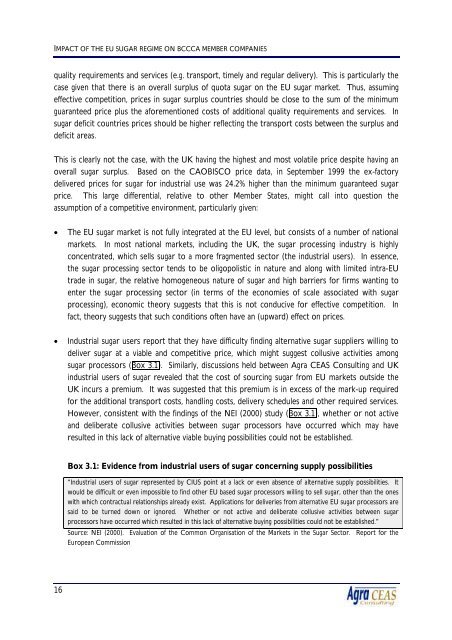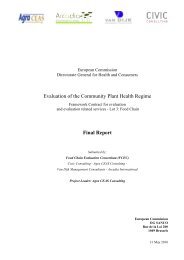2205 final report.pdf - Agra CEAS Consulting
2205 final report.pdf - Agra CEAS Consulting
2205 final report.pdf - Agra CEAS Consulting
You also want an ePaper? Increase the reach of your titles
YUMPU automatically turns print PDFs into web optimized ePapers that Google loves.
IMPACT OF THE EU SUGAR REGIME ON BCCCA MEMBER COMPANIES<br />
quality requirements and services (e.g. transport, timely and regular delivery). This is particularly the<br />
case given that there is an overall surplus of quota sugar on the EU sugar market. Thus, assuming<br />
effective competition, prices in sugar surplus countries should be close to the sum of the minimum<br />
guaranteed price plus the aforementioned costs of additional quality requirements and services. In<br />
sugar deficit countries prices should be higher reflecting the transport costs between the surplus and<br />
deficit areas.<br />
This is clearly not the case, with the UK having the highest and most volatile price despite having an<br />
overall sugar surplus. Based on the CAOBISCO price data, in September 1999 the ex-factory<br />
delivered prices for sugar for industrial use was 24.2% higher than the minimum guaranteed sugar<br />
price. This large differential, relative to other Member States, might call into question the<br />
assumption of a competitive environment, particularly given:<br />
• The EU sugar market is not fully integrated at the EU level, but consists of a number of national<br />
markets. In most national markets, including the UK, the sugar processing industry is highly<br />
concentrated, which sells sugar to a more fragmented sector (the industrial users). In essence,<br />
the sugar processing sector tends to be oligopolistic in nature and along with limited intra-EU<br />
trade in sugar, the relative homogeneous nature of sugar and high barriers for firms wanting to<br />
enter the sugar processing sector (in terms of the economies of scale associated with sugar<br />
processing), economic theory suggests that this is not conducive for effective competition. In<br />
fact, theory suggests that such conditions often have an (upward) effect on prices.<br />
• Industrial sugar users <strong>report</strong> that they have difficulty finding alternative sugar suppliers willing to<br />
deliver sugar at a viable and competitive price, which might suggest collusive activities among<br />
sugar processors (Box 3.1). Similarly, discussions held between <strong>Agra</strong> <strong>CEAS</strong> <strong>Consulting</strong> and UK<br />
industrial users of sugar revealed that the cost of sourcing sugar from EU markets outside the<br />
UK incurs a premium. It was suggested that this premium is in excess of the mark-up required<br />
for the additional transport costs, handling costs, delivery schedules and other required services.<br />
However, consistent with the findings of the NEI (2000) study (Box 3.1), whether or not active<br />
and deliberate collusive activities between sugar processors have occurred which may have<br />
resulted in this lack of alternative viable buying possibilities could not be established.<br />
Box 3.1: Evidence from industrial users of sugar concerning supply possibilities<br />
“Industrial users of sugar represented by CIUS point at a lack or even absence of alternative supply possibilities. It<br />
would be difficult or even impossible to find other EU based sugar processors willing to sell sugar, other than the ones<br />
with which contractual relationships already exist. Applications for deliveries from alternative EU sugar processors are<br />
said to be turned down or ignored. Whether or not active and deliberate collusive activities between sugar<br />
processors have occurred which resulted in this lack of alternative buying possibilities could not be established.”<br />
Source: NEI (2000). Evaluation of the Common Organisation of the Markets in the Sugar Sector. Report for the<br />
European Commission<br />
16













